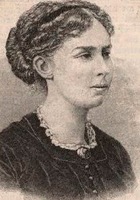Augusta Davies Webster Biography
Born in 1837, Webster was a prolific writer in every genre, a self-educated classical scholar, a professional poetry reviewer, an activist, and an educator. She began her literary career as a young girl and had published two volumes of poetry, two well-received translations of Aeschylus and Euripides, and a three-volume novel by the time she became a very active member of the London Suffrage Society in the 1860s. During the 1870s Webster continued to support suffrage for women and the women’s movement in general, as well as liberalism and individualism, in a series of essays that she wrote for the Examiner and later published as A Housewife’s Opinions. Beginning in 1879, she served two terms on the London School Board, with the second term concurrent with her position as one of the main poetry reviewers for the Athenaeum. She consistently published poetry and drama in these years, as well as a children’s novella. Webster was married and had one daughter. In the 1880s she hosted literary salons and was one of the most respected literary, political, and social figures in London until she died of cancer in 1894. Webster disappeared from view immediately after her death, and critics are only now beginning the process of exploring the rich diversity of her work. The recent increased interest in Julia Augusta Webster bodes well for a more complete understanding of the significance of Webster’s work as a writer and professional critic, as well as her effectiveness as an activist and political figure. However, as this bibliographic project demonstrates, relatively few scholars have focused on the work of this woman of significance in the last half of the 19th century.
Biography
The only biographically focused work to date is Patricia Rigg’s book. Rigg 2009 makes use of archived letters and family records in the United Kingdom and the United States to construct as comprehensive an account of Webster’s early family connections, marriage, motherhood, activism, and professional reviewing work as archival materials allow.
Birds sing "I love you, love" the whole day through,
And not another song can they sing right;
But, singing done with, loving's done with quite,
The autumn sunders every twittering two.
...
Dead is he? Yes, our stranger guest said dead--
said it by noonday, when it seemed a thing
most natural and so indifferent
as if the tale ran that a while ago
...
Young laughters, and my music! Aye till now
The voice can reach no blending minors near;
'Tis the bird's trill because the spring is here
And spring means trilling on a blossomy bough;
...
TOO rash, sweet birds, spring is not spring;
Sharp winds are fell in east and north;
Late blossoms die for peeping forth; Rains numb, frost
...
(The Doubter lays aside his book.)
"Answered a score of times." Oh, looked for teacher,
is this all you will teach me? I in the dark
...
